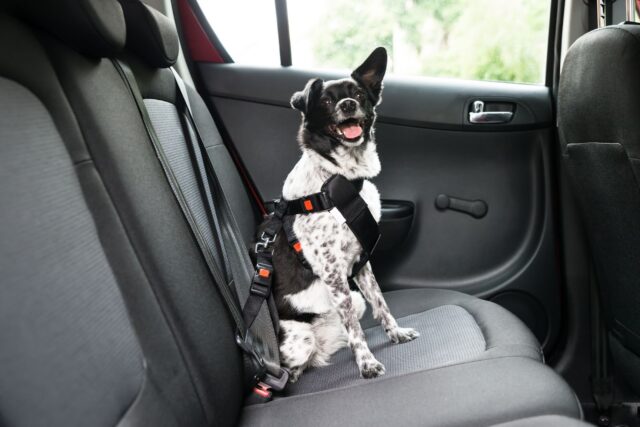Motorists are being warned to take precautions when travelling with their dog in order to avoid accidents and large penalties.
Experts from Quotezone.co.uk have urged pet owners to make sure their pets are suitably restrained while driving.
Motorists failing to do so can face fines of up to £5,000 and nine penalty points on their licence.
The Highway Code states dogs must be restrained with a seat belt harness, pet carrier, dog cage or dog guard, so they cannot distract the driver or cause injuries to themselves or others in the car.
In the worst case scenario, if there’s a car crash and the airbags activate, then it may cause serious injuries to the dog if they’ve been left to roam free in the vehicle.
Drivers breaching the rule are deemed to be driving carelessly which means that they can be hit with three to nine penalty points and receive a fine of £1,000 that can go up to £5,000 if taken to court.
Quotezone.co.uk CEO and Founder Greg Wilson said: “In addition to avoiding financial penalties, it’s critical to know the rules of the road in order to keep everyone safe.
“Although many motorists perceive nothing wrong with letting their four-legged companions roam freely inside the vehicle and stick their heads out the window, doing so can actually endanger the pup’s life.
“Every pet owner must make sure their pup is well looked after and restrained appropriately when travelling in a car, obeying the rules of the Highway Code, or risk invalidating both their car and pet insurance – leaving them unprotected should they need to make a claim.”
Here are Quotezone.co.uk’s tips on how to safely travel in the car with a dog:
Be secure
The safest way to restrain dogs is to use a crate, travel harness, carrier or a boot gate/dog guard. Dog owners can choose a solution that’s most suitable for their pet and install it to the vehicle.
Switch off the passenger airbag if the dog is in the front seat
Dogs are allowed to sit in the front, however it means that the passenger airbag must be turned off and the seat should be moved back as far as possible.
Don’t feed the dog just before or during the drive
Pet owners should leave a gap of at least two hours between feeding their dog and going for a drive, otherwise there may be a lot of cleaning up to do if the dog gets motion sickness.
Pack plenty of water
It’s important to keep your pooch hydrated along the journey. A good idea is to get a non-spill water bowl so the dog has access to water throughout the drive.
Take regular stops on long trips
Plan your journey so you have extra time to have stops along the way to go for walks and get some fresh air. These stops are especially important when the weather gets warmer, as dogs have a harder time adjusting to heat.
Don’t leave the dog in a hot car
Never leave your dog unattended in a car on a warm day, as it can cause them suffering and harm. Even with the windows open, they can quickly become dehydrated or experience heatstroke.
Don’t let your dog hang out the window
Although pups seem to love the fresh air, it’s incredibly dangerous to let dogs put their head out the window of a moving car, as well as wind damage to eyes and ears and a risk of getting hit by flying debris, there’s also a chance of hitting unexpected items outside the car.




